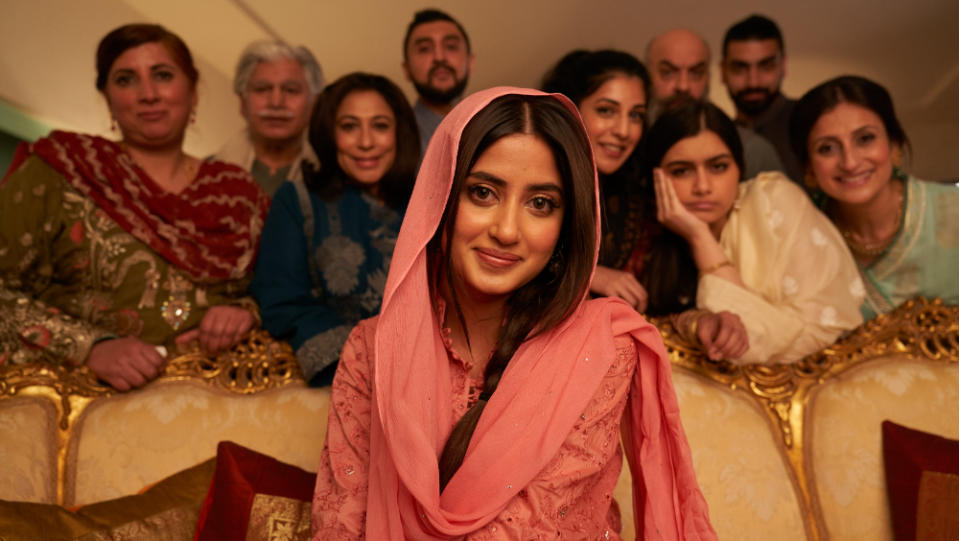The Brit Romcom Evolves, Makes a Theatrical Comeback With ‘What’s Love Got to Do with It?’

For a solid decade, the U.K. contributed some of the most iconic floppy-haired lotharios, airport dashes and front-door confessions in romcom history. Films such as “Four Weddings and a Funeral” (1994), “Notting Hill” (1999) and “Love Actually” (2003) basically invented such hallmarks of the genre.
But in the last decade, the global-facing British romcom has all but disappeared from cinemas. Richard Curtis, the brains behind the aforementioned hits as well as the “Bridget Jones” adaptations, says the heavy lifting keeping romcoms alive has largely been carried out in the television ranks. The writer cites examples such as the BBC’s “Gavin & Stacey” and “Fleabag” and Channel 4’s “Catastrophe” as “blazing examples.”
More from Variety
“Unexpectedly to me, I would say that trying to write vaguely autobiographical films with jokes in them about how complicated love is, has probably happened more on telly than in cinema,” Curtis tells Variety.
Curtis penned the last bonafide British romcom hit, “Yesterday,” which collected $154 million worldwide (including $19 million in the U.K.) in 2019, but also had a massive crutch in the film’s driving energy – the music of The Beatles. The writer applauds the success of “Ticket to Paradise” (2022), an American film starring George Clooney and Julia Roberts, directed by British filmmaker Ol Parker (“Mamma Mia! Here We Go Again”), which collected some $167 million worldwide, including $11 million in the U.K.
“I think [the success of] ‘Ticket to Paradise’ is really going to help people think this is a good commercial gamble rather than something that’s a risky genre. It’s always going to help to have one hit because from that, other people get confidence,” Curtis says.
But while the British romcom has advanced on U.K. television, the glut of programming on streamers may have held back the genre’s progress, according to the head of a British studio specializing in the genre.
“In the early days of the streamers, quite a few romcoms got made that weren’t very good. If you want to make any sort of movie, but particularly in this genre, they’ve got to be really good, and you’ve got to spend time on the script,” the source tells Variety. “Like any movie, you’ve got to find the right director, and you’ve got to cast as wide as you possibly can. And probably, that rule wasn’t being applied for a while to romantic comedies, and they weren’t good enough. And the audience speaks when it’s not good enough.”
Netflix’s widely panned Valentine’s Day tentpole “Your Place or Mine,” dismissed by Variety critic Owen Gleiberman as having “no tension, no comedy with any bite” and “no romantic friction,” bears out the studio head’s words. The executive says people had gotten out of the habit of visiting cinemas to watch romcoms and until a hit like “Ticket to Paradise” came along, they didn’t really have a “compelling enough” reason to do so.
The next compelling reason could well be Working Title and Studiocanal’s “What’s Love Got to Do with It?” which began its global rollout at the end of January. Directed by Shekhar Kapur (“Elizabeth”), the film, which marks the writing debut of producer Jemima Khan, reinvigorates the romcom with a multicultural twist. It follows U.K.-based documentarian Zoe (Lily James) who travels to Pakistan to film the arranged marriage of her British-Pakistani best friend Kazim (Shazad Latif) to Maymouna (Sajal Ali). Adding to the mix are Zoe’s mother Cath (Emma Thompson) and Kazim’s mother Aisha (Shabana Azmi).
Khan is well familiar with both British and Pakistani milieus, having been married to former Pakistani cricket captain and Prime Minister Imran Khan. “Writing a romcom about Pakistan was really what I wanted to do – I wanted to write something loving and joyful because quite a lot of the news that comes out of Pakistan is dark and difficult,” Khan tells Variety, adding that depictions of the country tend to focus on the darker side, with Pakistanis stereotyped as terrorists and fanatics. She wanted to show a different Pakistan, where she had lived.
Khan also set out to correct Western preconceptions about arranged marriage. “I had gone there thinking that arranged marriage was a very outdated concept that I couldn’t fully understand. And then, when I was in Pakistan, it became so normal; it was a normal thing. I was the only love marriage in my ex-husband’s family, and the only one that ended in divorce,” Khan says.
Khan’s experience of watching some of the happiest, most successful marriages having been arranged — or suggested by the parents, in which couples get to know each other and then make a decision about marriage — challenged the preconceptions she had before going to Pakistan, Khan says.

“Multiculturalism is the way forward for every genre, not just the romcom,” Kapur told Variety. The filmmaker said that the term “romcom” should be let go, because the genre now has a much bigger footprint. In Khan’s script, Kapur saw attempts to make the film broader than a romcom and found complexity in the writing. The filmmaker said that if “What’s Love Got to Do with It?” was purely a romcom like “Four Weddings and a Funeral,” he wouldn’t have done it. “What do I bring to it?” asks Kapur.
“I realized it’s going to work as a big, emotional piece,” Kapur says, adding that at the end of the very first script reading, the cast was in tears. He channeled the emotions he’d brought into his debut feature “Masoom” (1983) and the comedy and romance in his sophomore feature “Mr. India” (1987) into “What’s Love Got to Do with It?”
Curtis is also an advocate of how multiculturalism can rejuvenate the British romcom. “Yesterday” starred Himesh Patel, who is of South Asian origin, though he wasn’t cast for that reason and was selected because he was the team’s “favorite actor for the role.”
“It’s pretty clear that my movies are not as diverse as they should be, and that reflected my own experience, unfortunately. But if you’ve got a whole world of new actors who are rising brilliantly and rising fast, then it doubles the ingredients that you can add,” Curtis says. “There are all sorts of interesting and exciting things to be said about culture clashes, expectations, all those kinds of things.”
“What’s Love Got to Do with It?” debuted at the Toronto International Film Festival in 2022, won best comedy at the Rome Film Festival and opened the Red Sea Film Festival. Kapur said the response has been phenomenal, with audience members saying the film feels like “a big hug.”
“I’m a little surprised by the response to this film, but I think part of that response is, we haven’t seen anything like this for a long time. And there is this emotional hangover from COVID,” Kapur notes.
“What’s Love Got to Do with It?” producer Nicky Kentish Barnes, whose credits also include romcoms “About a Boy” and “About Time,” wants the British romcom, which she describes as being “stuck in a formula,” to explore in more depth various lives and households that haven’t been touched before and incorporate different ways of life.
“That’s the way it should continue — just exploring the same theme, but in different avenues,” Kentish Barnes says. Curtis echoes her thoughts and wants geographic specificity in the films, citing “The Full Monty” and “Local Hero,” which though not romcoms, were redolent of specific locations.
“It might be a good idea to move out of a London a bit, I think that might be one of the secrets,” Curtis says, adding that the genre needs to use the best TV writers and see what they want to do in the cinematic vein.
He also strikes a note of caution. “Beware of the tropes. And then once you’ve written some that you really believe in, see if you can dig back and use any of them,” Curtis says.
Meanwhile, Studiocanal has wide global plans for “What’s Love Got to Do with It?” CEO Anna Marsh says there have been fewer theatrical releases for romcoms since the pandemic and adds that sometimes, the high concept approach to romcoms may find themselves contained to some markets because of very local comic themes.
“Our mandate really is to make content that can travel the world, so while ‘What’s Love Got to Do With It?’ is anchored in the U.K. and British culture, there are so many themes that resonate the world over,” Marsh tells Variety. “And ultimately, it is a story about love. It’s a story about family. It’s a story about being open and accepting one another for who we are no matter where we come from. And I think those themes definitely mean a lot to us at Studiocanal. And we want to be making those kinds of movies.”
“What’s Love Got to Do with It?” opens in the U.K. on Feb. 24. Shout! Studios will release it in the U.S. in late spring.
Best of Variety
Sign up for Variety’s Newsletter. For the latest news, follow us on Facebook, Twitter, and Instagram.

 Yahoo News
Yahoo News 
